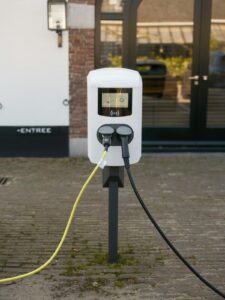
Home / EV Charging News / Battery technology and advancements: The future of electric vehicles
Battery technology has been a key driver of the electric vehicle (EV) revolution. As the world becomes increasingly focused on reducing carbon emissions and transitioning towards renewable energy sources, EVs are gaining popularity due to their lower carbon footprint and reduced dependence on fossil fuels. However, the success of EVs depends heavily on the performance and cost of battery technology. In this article, we will discuss the latest advancements in battery technology and how they will shape the future of electric vehicles.
There are various types of batteries used in electric vehicles. The most common types are Lithium-ion (Li-ion), Nickel-Metal Hydride (NiMH), and Lead-Acid batteries.
Li-ion batteries are the most popular and widely used batteries in EVs due to their high energy density, longer lifespan, and better performance. NiMH batteries have a lower energy density but are cheaper than Li-ion batteries. Lead-Acid batteries are heavy, have a short lifespan, and are mainly used in low-speed electric vehicles.
Despite the advancements in battery technology, there are still several challenges that need to be addressed. The most significant challenge is the cost of manufacturing and the limited availability of raw materials. Battery technology also needs to become more sustainable and environmentally friendly, as the production of batteries can be resource-intensive and result in significant carbon emissions.
The advancements in battery technology also present new opportunities for the industry. EVs could become cheaper and have longer ranges, which would make them more accessible to a wider range of consumers. Battery technology could also be used to store renewable energy and help balance the electricity grid, making it more resilient and reliable.
Electric vehicles today typically use Lithium-ion batteries, which have undergone significant improvements over the years. The energy density of Li-ion batteries has increased, which means that they can store more energy in the same amount of space. The cost of Li-ion batteries has also decreased over time, making electric vehicles more affordable.
However, Li-ion batteries have their limitations. They can degrade over time and lose their capacity, which means that the range of the electric vehicle may decrease over time. They can also be dangerous if they are damaged or overheated. Finally, Li-ion batteries rely on rare earth metals such as cobalt, which can be expensive and difficult to source sustainably.
Several new battery technologies are being developed that could potentially replace Li-ion batteries. These technologies are being developed with the aim of improving the energy density, safety, cost, and environmental impact of batteries.
Battery technology is a crucial component of the electric vehicle industry. The development of new battery technologies has the potential to make electric vehicles more affordable, sustainable, and reliable. Solid-state batteries, Lithium-sulfur batteries, Flow batteries, and Sodium-ion batteries are some of the promising new technologies that could replace Li-ion batteries. While there are still challenges that need to be overcome, the future of battery technology is bright, and it has the potential to revolutionize the way we store and use energy.
$2,890.00 Original price was: $2,890.00.$2,790.00Current price is: $2,790.00.
$3,950.00 Original price was: $3,950.00.$3,450.00Current price is: $3,450.00.
$1,650.00 Original price was: $1,650.00.$1,590.00Current price is: $1,590.00.
$2,290.00 Original price was: $2,290.00.$2,150.00Current price is: $2,150.00.
$1,290.00 Original price was: $1,290.00.$799.00Current price is: $799.00.

Your Power Management Partner for Over 25 Years Future Generations Depend on Our Decisions Today ™
2024 © All rights reserved by CyberSwitching